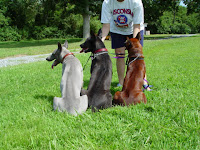 |
| Ridgeback dog breeds, Dog breeds with a ridge on their back |
Some researchers believe that it were the Phu Quoc dogs or their ancestors which were transported from India and Thailand to the southern African mainland and formed the basis for a ridgebacked breed on the African continent. Ancient Indian dogs may have accompanied the earliest Indian trade vessels and interbred with the early Khoi dogs on the African mainland.
Other cynologists believe that the Ridgeback is indigenous to Africa but was taken to Vietnam, either by the Arabs trading with China, or by the Portugese and Dutch, trading in ivory and gold between Africa and the East from the 15th to the 18th century.
In that case the Khoi dog may have transmitted the ridge feature, not only to the Rhodesian ridgeback, but also to the Asian ridgebacked dogs, even if indirectly. The fact the some Khoi dogs inhabited sparsely populated areas where contact with other dog groups was limited, explains why this spontaneous genetic mutation became fixed in this breed.
While we may conclude that African ridged dogs are indigenous to Africa, it does seem that the Phu Quoc dog and Rhodesian Ridgeback originate from the same basic pariah stock common to southern Asia and Africa.
The Rodhesion ridgeback is the only of the five ridgebacked dogs that was granted championship status, in 1954.
FCI Standards for Thai Ridgeback:
GENERAL APPEARANCE
Medium-sized dog with short hair forming a ridge along the back. The body is slightly longer than its height at withers. Muscles are well developed, and its anatomical structure is suitable for activities.IMPORTANT PROPORTIONS
Length of body : Height at the withers = 11 : 1ODepth of chest : Height at the withers = 1 : 2
BEHAVIOUR / TEMPERAMENT
Tough and active with excellent jumping ability. A loyal family dog.HEAD
CRANIAL REGIONSkull : The skull is flat between the ears but slightly rounded when seen from the side.
Forehead : Wrinkles when the dog is attentive.
Stop : Clearly defined, but moderateFACIAL REGION :
Nose : Black. In blue dogs, the nose is bluish.
Nasal bridge : Straight and long.
Muzzle : Wedge-shaped, slightly shorter than skull.
Lips : Tight with good pigmentation.
Mouth : Black marking on the tongue is preferable.
Jaws : Upper and lower jaws are strong.
Teeth : White and strong with scissors bite.
Eyes : Medium size and almond shaped. The eye colour is dark brown. In blues, amber-coloured eyes are permitted.
Ears : Set on sides of the skull. Medium sized, triangular, inclining forward and firmly pricked. Not cropped.
NECK
Medium length, strong, muscular, slightly arched and holding head high.BODY
Back : Strong and level.Loin : Strong and broad.
Croup : Moderately sloping.
Chest : Deep enough to reach the elbows. The ribs are well sprung, but not barrel-shaped.
Lower line : The belly is well tucked up.
TAIL
Thick at base with gradual tapering toward the tip. The tip can reach hock joints. Carried vertically and slightly curved.LIMBS
FOREQUARTERS :Shoulder : Well laid back.
Forearm : Straight.
Pastern : Straight when seen from the front and very slightly sloping when seen from the side.
Feet : Oval
Nails : Black but can be lighter depending on coat colour.
Thighs : Well developed with well bent stifles.
Hocks : Strong and well let down.
Rear Pastern : Straight and parallel when seen from the rear.
Feet : Oval
FEET : Medium sized, short, oval, pointing straight foreward with strong pads and well knuckled up.
GAIT
Reachy stride with no pitching nor rolling of the body. Parallel tracking at normal speed. When viewed from the front, the forelegs move up and down in straight lines so that the shoulder, elbow and pastern joints are approximately in line with each other. When viewed from the rear, the stifle and hip joints are approximately in line. Movement in a straight line forward without throwing the feet in or out; thus enabling the stride to be long and drive powerful. The overall appearance of the moving dog is one of smooth flowing and well balanced rhythm.SKIN
Soft, fine and tight. Throat : no dewlap.COAT
HAIR : Short and smooth. The ridge on the top region is formed by the hair growing in the opposite direction to the rest of the coat. It should be clearly defined from other parts of the back. There are various shapes and lengths of ridge, but must be symmetrical on either side of the backbone and within the width of the back. Crowns or whirls at the head of the ridge are acceptable.COLOUR : Solid colour : red, black, blue and very light fawn (isabella). Black mask is preferable in reds.
SIZE
Ideal height at the withers : Dogs 22-24 inches (56-61 cm) Bitches 20-22 inches (51-56 cm).There is a tolerance of plus or minus one inch (2.5 cm).




hmm i like this ridgeback breed
ReplyDeleteI'm familiar with the fact that a strong natural selection made only strongest of thai ridgebacks to survive so common sense tells me that these dogs are tough and healthy. Still, I would like to know does the breed have big health issues and can you train these dogs to be good guard dogs and protectors of their family
ReplyDeleteThe Thai Ridgeback is very devoted to their family and they are a natural guard dog and protector. They do not need training in the protection area because it is so natural.
ReplyDeleteEvery dog protects its territory and its pack this is something comes to them naturally.....but the training got its own importance...how dog will know when u want him to attack some1 or when to stop?
Delete